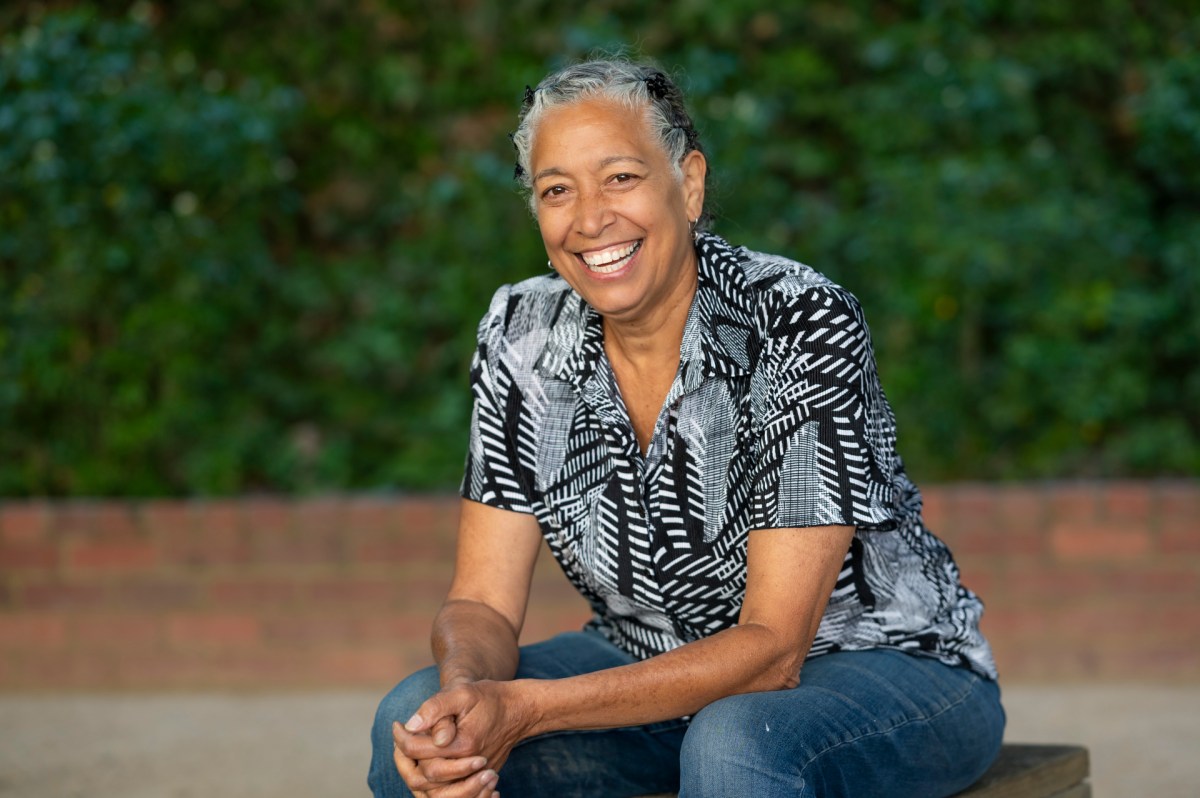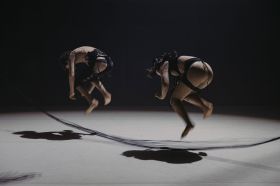Aboriginal and Torres Strait Islander readers are advised that this story contains the names and an image of people who have died.
One of Dr Rachael Maza AM’s key learnings from almost 18 years at ILBIJERRI, the First Peoples theatre company she has led creatively since 2008, has been learning to trust her gut.
‘Often, as artists, it’s our gut feeling, our instinct that drives us forward. You just get a good feeling about something. Often we’ll just go, “Aww, this feels great,” or, “Oh yeah, this feels urgent or important … [or] I can see this is the direction we need to go,” she tells ArtsHub.
‘And one definite learning for me [at ILBIJERRI] has been becoming better at articulating what that [direction] is. In particular, one of the things that’s become really key to me is realising that … we’re in the business of creating the narratives. And that is so critically important and it is such a political act.’
To illustrate her point, Maza – a proud Yidinji, Meriam and Dutch woman who will be stepping down from ILBIJERRI at the end of the year – points to 2023’s ‘disastrous referendum,’ which ‘demonstrated how clearly we are not ready as a country to acknowledge the truth of how it was founded, and how completely consumed by fear we still are, and ignorance’.
The no campaign’s ‘If you don’t know, vote no,’ slogan was ‘just genius,’ Maza explains. ‘If you think about it, that is the metaphor for our psyche as a country. I mean, it speaks so loudly and truly to where and [who Australians are]. Hence, the role that we play as theatre-makers and storytellers is about shifting that ignorance and that fear through the narratives that we create.
‘So the big learning for me was the realisation that we as narrative-makers have such a seriously, critically important role to play, because it’s those same narratives that shape a nation.’
Countering the narrative, not reinforcing it
When challenging such damaging narratives, it’s important to do so by telling a story that counters them, Maza believes.
‘So it was really important to me that we’re not getting caught in this victim trope, the disadvantaged victim, the downtrodden, the massacred, the violence, the suicide. All of that’s true, but it’s not who we are in our totality. It’s a spin off from the impacts of colonisation and being and living as an outcast on our own lands. So those are the impacts, but that’s not who we are,’ she emphasises.
‘And hence that beautiful saying that I heard Uncle Gary Foley saying – he would hate it that I just called him Uncle! But anyway, Gary Foley said all those years ago, “History will be kind to me, for I intend to write it”. I think he stole it off Winston Churchill, even though that’s been disputed.’
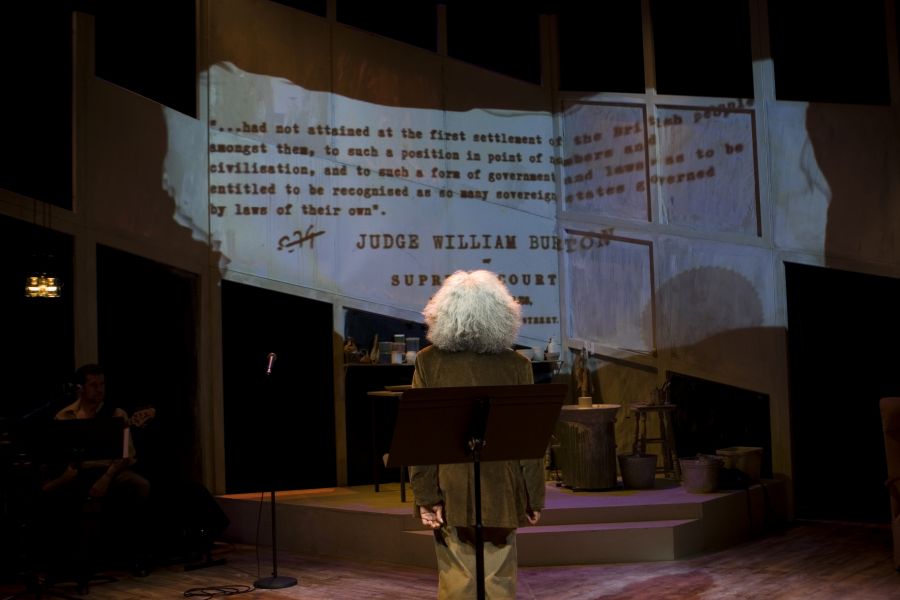
ILBIJERRI, Maza argues, ‘are in the business of creating the narratives that are going to shift the way that we talk about who we are as a people, and so it’s critical to me that we don’t skirt around things. We talk, we have the hard conversations. But ultimately, the takeaway message needs to be that we can be extraordinary. We’re resilient, we’re tenacious, we’re sophisticated, we’re smart, we’re survivors – more than survivors. We’re the drivers.
The theatre company, in Maza’s words, is ‘in the business of countering those tropes and flipping it on its head. The truth of who we are is something that we should be celebrating and embracing as a country – the First Peoples of this country and their extraordinary cultures, and the fact that we are the longest continuous living culture in the entire existence of humans on this planet. That is to be so celebrated and embraced, and that is something that that enriches all of us,’ Maza says passionately.
ILBIJERRI and the ecology of scarcity
Maza has been at the helm of ILBIJERRI since February 2008, meaning that when she steps down in December, it will be after almost 18 years in the role. She’d planned to go sooner, but failed to meet the self-imposed deadlines she kept setting herself. ‘I just kept extending it,’ Maza says.
‘It’s not for lack of talent,’ she tells ArtsHub a few days after her original interview, in which she also acknowledged that one of the major, unsolved challenges facing First Peoples’ theatremaking in this country is what she calls the ‘ecology of scarcity’, due to the lack of strategic investment in the sector.
‘For quite a long time in this job, it felt like you’re sitting on a chair and at any moment, if one of the legs comes off, you’re on the ground. And that was always the feeling, just that fragility of small arts organisations – and even smaller if you’re a Blak organisation – knowing that every time we recruit for a position there’s no line outside the door. To this day, 18 years in the job, we’re still existing in this kind of ecology of scarcity,’ Maza says.
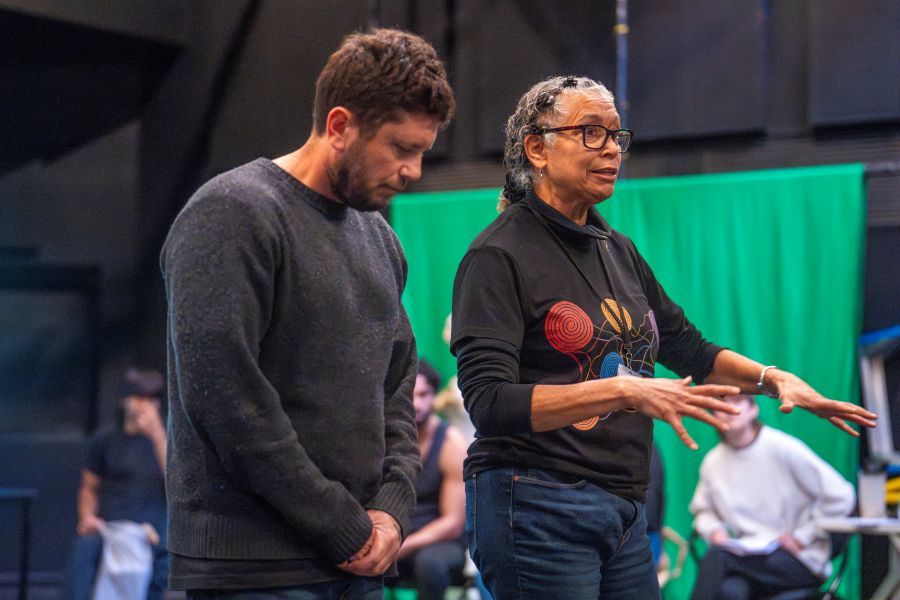
There is growth, though ‘it’s incredibly slow in building,’ Maza says. ‘We are making progress but certainly in theatre, there are definitely areas where we’re still got a long way to go.’
The paucity of Aboriginal and Torres Strait Islander directors in the industry was what first drove Maza – originally an actor, earlier in her career – to take up directing and ultimately, to become ILBIJERRI’s Artistic Director.
‘I was particularly resistant … and rebellious to this comment that I kept hearing, “Oh, we tried to get a Black director to do this Blak work, but there just wasn’t anyone out there. There’s just no one who could have done it.” When I started as an actor, there were very few Black directors, and all the jobs I was doing – theatre, television, film – essentially some white hand was in creative control of those projects, whether it was directing or writing or producing.
‘It was completely the reason why I threw in my acting hat, I was so over it, and moved into directing, and then eventually got dragged kicking and screaming into this job as an artistic director,’ she says.
Additionally, Maza knew she could not leave ILBIJERRI until the time was right. ‘The other thing that’s kept me here all this time has actually been waiting for the right moment, when it feels like the company is in a good, solid position, both internally, financially, artistically, culturally, and in terms of its standing, how it’s perceived within the sector, all of those things.’
A number of factors recently convinced Maza it was finally time for her to move on, including ILBIJERRI joining the National Performing Arts Partnership Framework in 2021, coupled with her growing confidence in the upcoming generation of Black artists.
‘The team that we have here in ILBIJERRI are so solid. Every single one of them are absolutely amazing in their own rights and their strengths, in their in their designated areas and expert areas of expertise … and this next generation coming up of black theatre makers, storytellers are so articulate, intelligent, staunch, talented and amazing – I was reminded of that, and it just filled me with complete confidence in the future of Blak theatre … There’s options now in terms of strong creative leadership – there’s actually quite a lot of amazing, staunch and talented young blackfellas out there now.’
The future of First Peoples performing arts
Returning to the entrenched ‘ecology of scarcity’ Maza has described, she discusses the recently released First Nations Performing Arts Workforce Development Framework 2025-2030, which ILBIJERRI helped develop alongside the other federally-funded First Nations performing arts companies – Bangarra Dance Theatre, BlakDance, Moogahlin, Yirra Yaakin, NAISDA Dance College and Marrugeku.
A rigorous and detailed document developed ‘from an extraordinary process of consultation’, which Maza says she is proud to have played a part in creating, the Workforce Development Strategy addresses the current challenges facing First Peoples performing arts companies in significant detail.
It acknowledges the need for increased representation and leadership of First Peoples in the performing arts, and the importance of First Peoples’ sovereignty and cultural representation in the sector; simultaneously, the Framework looks to the future and the need for long-term solutions to the challenges Maza has described.
‘You know, a kid goes, “Oh, I want to be a designer”. They’ve got to then study for four or five years, and so there’s two things there … So a whole issue that this document also touches on is identifying the need for us, collectively as a sector – the village, our village – to think, “How are we all working together to build these pathways in a really sustained, strategic, long term way – identifying [opportunities] right from secondary school to tertiary to intern to scholarships, and then, of course, work opportunities?” So where are those [opportunities], and how do we as an industry pull together to really be strategic? It’s going to take some real investment,’ she says.
ArtsHub will be exploring the First Nations Performing Arts Workforce Development Framework 2025-2030 in detail in the coming weeks.
Returning to freelancing and the future of ILBIJERRI
Soon, ILBIJERRI will be announcing Maza’s successor: the company’s new Artistic Director. One of their challenges will be steering ILBIJERRI into the future without losing the passion and the creativity Maza has brought to the role.
‘Like, what’s so critical is that the company never loses its core values, and that lives and exists in who we are as blackfellas – our protocols, our values, underpin everything we do, from the work that we make to how we work as a team. For the company, I think there’s still room for more growth,’ Maza says, reflecting on the fact that under her watch, ILBIJERRI has grown from a small team of three staff to an established and nationally significant company employing 12 people – with additional recruitments currently underway.
‘The challenge for the new team going forward will be just, keeping a check on that. You can never lose your foundation of who you are, because, of course, that foundation and those roots underpin and feed all the work, and why the work works so brilliantly, because it’s grounded. It’s grounded in a strong core – the foundational aims and objectives and goals of what who we are and why we do what we do as a company,’ she tells ArtsHub.
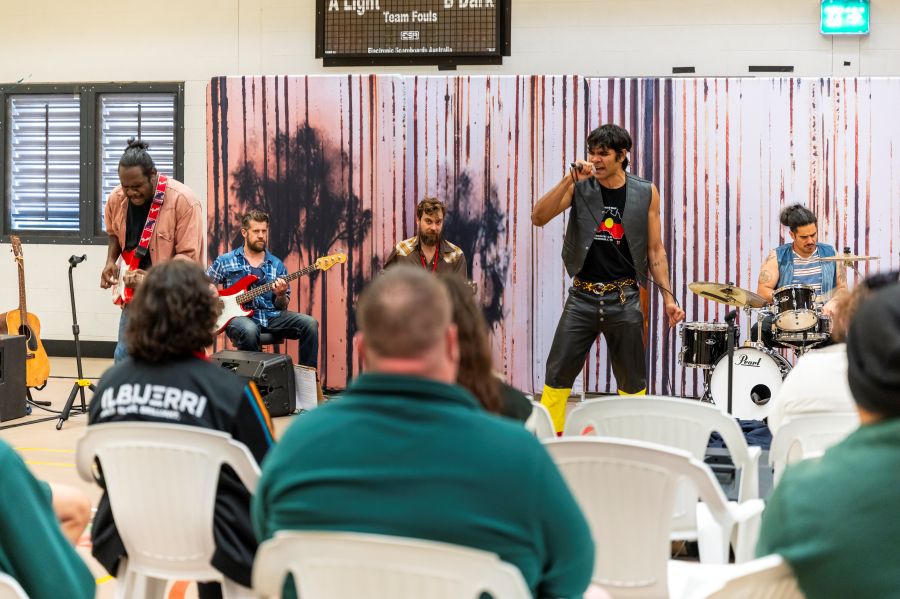
Maza’s time at ILBIJERRI will be remembered for such foundational works as CORANDERRK: We Will Show the Country (later reworked with Belvoir as Coranderrk); Jack Charles V The Crown, featuring the late, much missed Uncle Jack Charles; the late Uncle Noel Tovey’s Little Black Bastard; Beautiful One Day, a collaboration with the people of Palm Island; the cross-country love story Heart is a Wasteland; another significant collaboration, Black Ties, created with Aotearoa/New Zealand’s Te Rēhia Theatre Company; and most recently, Big Name, No Blankets, a rocking, rollicking celebration of the Warumpi Band. The company’s work offstage, in social impact and in cultural and sector development, has also been prolific, significant and impactful during Maza’s tenure.
But in her heart of hearts, Rachael Maza is happiest as a freelancer. ‘I started out as an independent freelance artist, and I love it. It suits me to a tee. And there’s always been a little part of me that’s resented full-time work. Just the every day, every week kind of thing. Not the work itself.’
‘The work [here] has been phenomenal. The team is phenomenal. Everything is amazing about this job. It’s just that it’s always on – and that’s probably my own fault. For years, the first 10 years, say, I probably never took a holiday. You know, stupid things like that,’ she laughs.
Read: Back yourself: an honest guide on how to be a creative freelancer
But before she returns to freelancing – including the possibility of picking up her first love, acting, after a long absence – Maza says the ‘first thing I need is space, because I just need to meet myself again. Who am I outside of ILBIJERRI? I so don’t know myself outside of this jacket, the ILBIJERRI jacket that I’m now wearing. So really, just the first thing is I need some space.’
In 2026, Maza says, she also needs to get hungry again. ‘I keep making this joke, but I think I’m quite serious. I actually just need to remember what it’s like to be hungry again, metaphorically and artistically. Like, what is that? What does that look like, and what comes from those moments of being hungry and being bored? Like, I just want to find that again.’
Stepping down from ILBIJERRI will also enable Maza to embrace another side of her creative practice which has long lain fallow.
‘Also, I love theatre, but I’m also a musician. I’m really keen to get back into my music. So me and Lisa, my sister, have always sung together, so we’re going to be recording our music after – how old am I? Anyway. After 40, 50 years of songwriting, we’ve never recorded any of our music, actually, with the exception of one song. So we’re going to, for the first time ever, as a couple of old ladies, record our original music, which is so exciting,’ Maza concludes, laughing.
Dr Rachael Maza AM finishes up at ILBIJERRI Theatre Company at the end of 2025. The company’s new Artistic Director will be announced in the coming weeks.
Note: This article was updated after publication on 18 September at 1:43pm to clarify Maza’s position on the ecology of scarcity and her long tenure at ILBIJERRI, including the insertion of a new quote. At Maza’s request, the attribution of a quote was also corrected.

